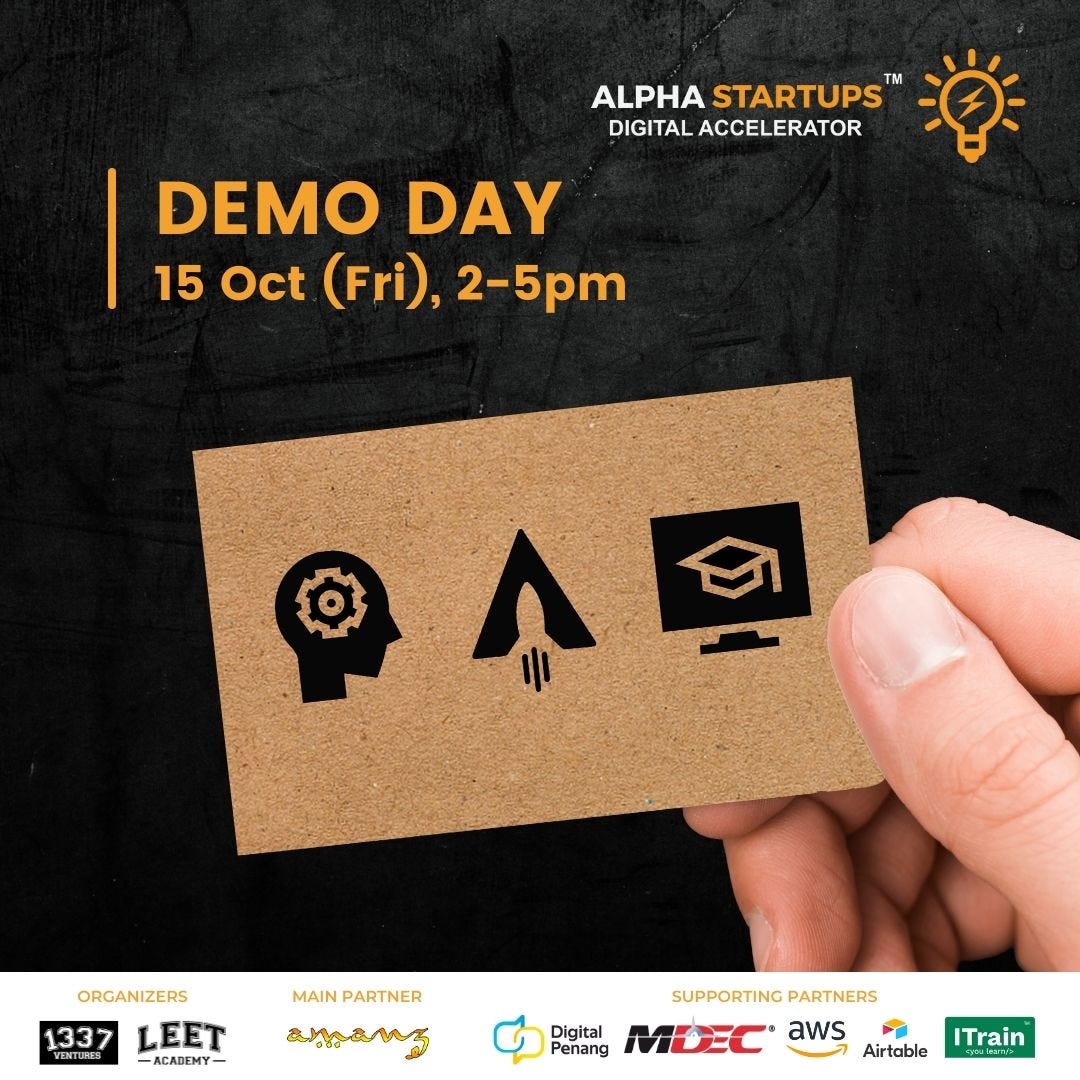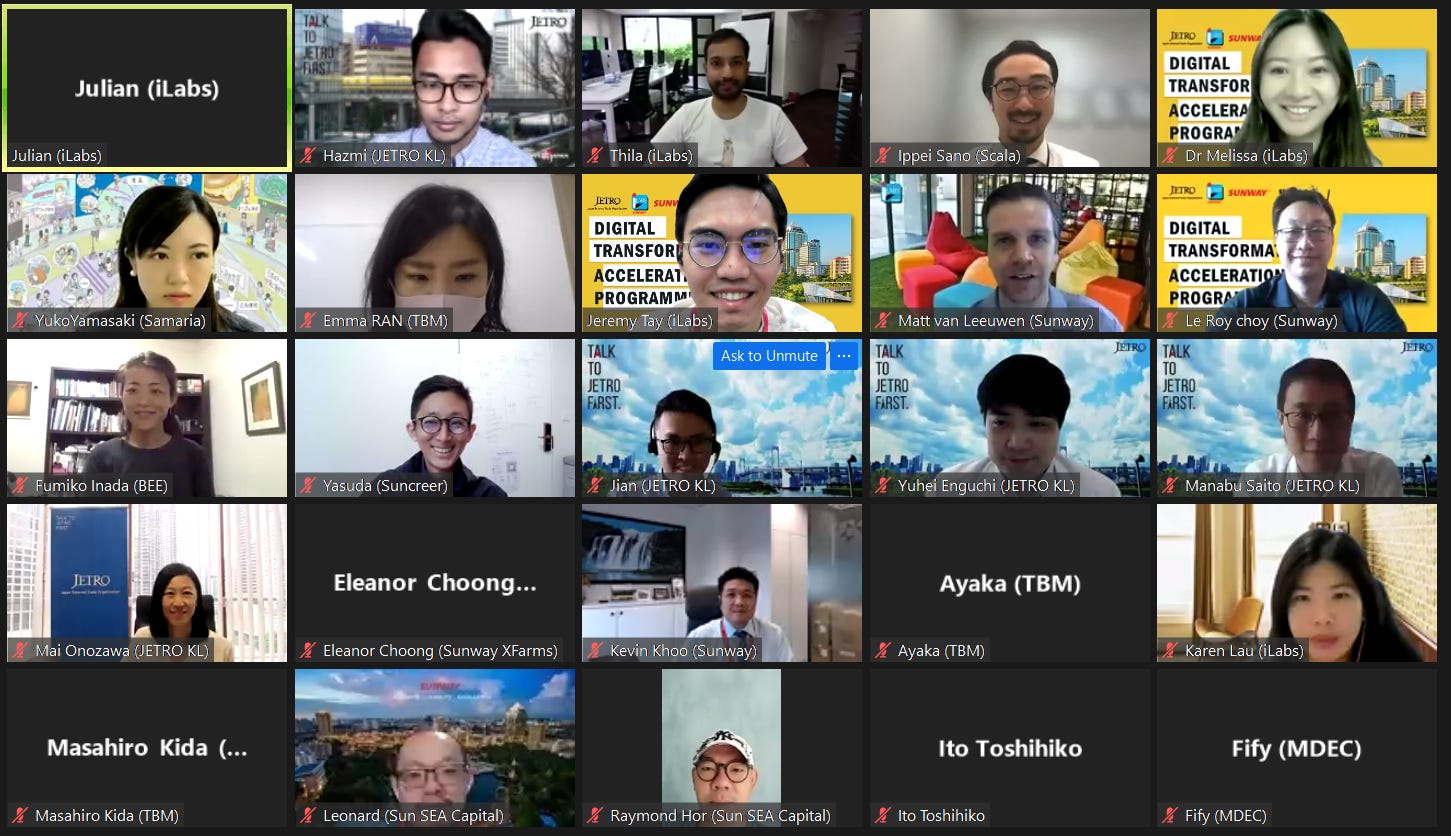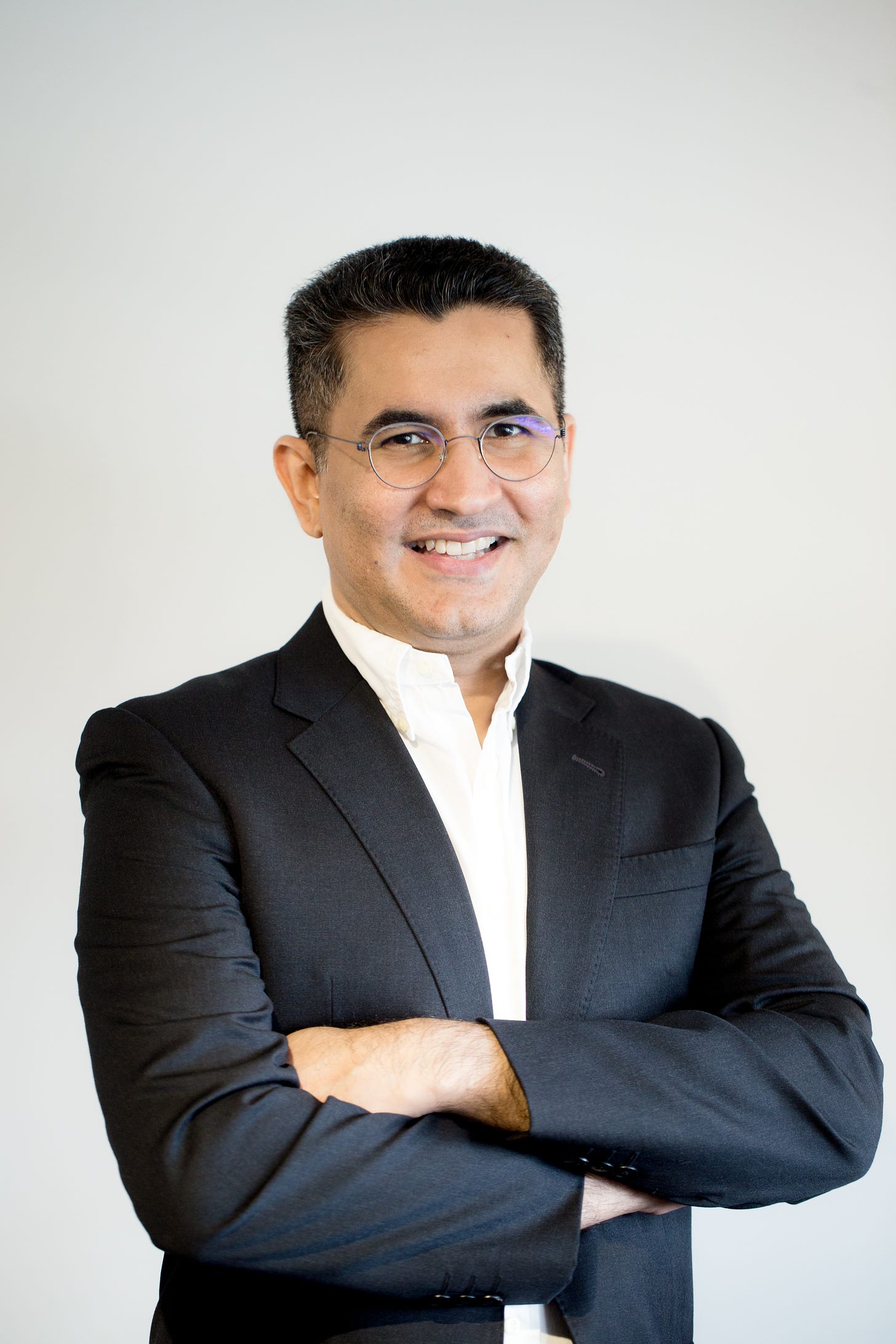Demi Laut: Leading The Way In Uplifting & Upskilling Fishermen
Welcome back to an-all new Head’s Up. In collaboration with SATU Creative, we bring you entrepreneurs who are tackling challenges and continuing to rise up to new occasions.
This week, we have Haaziq Ibrahim, Chief Executive Officer of Brique Engineering Solution who shares with us on his journey on leading an enterprise and how his #DemiLaut project is helping fishers pivot challenges in the face of Covid-19.
We also have Bikesh Lakhmichand, CEO & Founding Partner of 1337 Ventures who shares a little more on “Reinvestment Allowance” type of incentives that he hopes to see considered in the upcoming Budget 2022.
But just before you are off to read the rest of the issue, here are some news and announcements,
News & Announcements
The Shell LiveWIRE programme for Sarawakian entrepreneurs is now open for registration.
Are you a Sarawakian innovator or social entrepreneur aspiring to positively impact the community and environment?
Join us for a series of 10 Shell LiveWIRE Webinars from 6 November 2021 to 5 December 2021 to take your idea to the next level.
This year’s five selected winners will receive a business grant of RM15,000 and one year of coaching and mentoring.*
Register today at https://bit.ly/sarawaklivewire2021
The Shell LiveWIRE programme for Sarawakian is organised in collaboration with Tabung Ekonomi Gagasan Anak Sarawak (TEGAS).
* Terms and conditions apply
Join the Alpha Startups™ Digital Accelerator Cohort 38 Demo Day to watch the Top 10 finalists pitch live to a panel of esteemed judges from 1337 Ventures, Amanz.my, MDEC & Digital Penang.
They will be competing to be the Top 2 startups who would receive up to RM50K funding. Calling all general public and investors interested, registration is now open. See you on 15 Oct, 2-5pm. RSVP at https://bit.ly/demoday38.
Sunway iLabs & JETRO Digital Transformation Acceleration Programme Third Cohort Commences
Sunway Innovation Labs (Sunway iLabs) has announced the five startups selected to go through a Digital Transformation Acceleration Programme organised in collaboration with the Japanese External Trade Organisation Kuala Lumpur (JETRO KL) a Japanese government-related organisation that promotes trade and investment.
The selected startups of this cohort fall within the five verticals of Fintech, Business Software as a Service (SaaS), Digital Health, Carbon Neutral and Agri-food Tech.
Each company stands a chance to receive a fully sponsored pilot project by Sunway in the form of a grant. At the end of the programme, all five startups will be given an opportunity to pitch their ideas to a wider network of local and regional venture capital funds, investors, industry leaders and corporations for funding or collaborations.
MDEC Announces 4IR Catalyst Grant
The Malaysia Digital Economy Corporation (MDEC) has announced the 4IR Catalyst Grant (4ICG) in support of scaling up Malaysian-based technology companies.
The grant will be used solely for the purpose of co-creation, problem-solving and commercialisation of 4th IR solutions, it said.
Successful local applicants will be awarded up to 50% of the total project cost, subject to a ceiling limit of RM2mil (US$470,000) whichever is lower. Chosen foreign owned companies will be awarded up to 30% of the total project cost, subject to a ceiling limit of RM2mil (US$470,000), whichever is lower.
Grant recipients will also be onboarded into MDEC’s GAIN programmes and will benefit from market access, business matching, funding facilitation and mentoring opportunities.
The new 4ICG application is now open for submissions. Applicants will be able to check their eligibility criteria and register their interest here.
Offering Reinvestment Allowances Beyond The Manufacturing Industry
According to Bikesh Lakhmichand, CEO & Founding Partner of 1337 Ventures, Reinvestment Allowance (RA) is a tax incentive that the Inland Revenue gives to manufacturing companies to reinvest their capital to embark on a project for either expansion of existing production capacity, modernisation or automation of the production facilities.
The incentive also encouraged for the diversification into related products.
“The spirit of the incentive is to encourage investment in machinery with the intent to increase productivity,” says Bikesh.
He further shares that the rate of the RA is 60 percent on the qualifying capital expenditure and is granted in addition to capital allowance. This means that for every RM1 that company spends on machinery, they enjoy RM1 back in capital allowance and an additional 0.60 cents to set-off against future profits.
Bikesh highlights that this incentive is powerful in that it makes the ROI of an investment in machinery more meaningful in a time when, as a nation, productivity was important to the competitiveness of our outputs.
The RA incentive was introduced when manufacturing was the backbone of Malaysia’s economy.
“If we are to progress into the new economy, our incentives must also be directed towards activities that encourage productivity in other forms, not necessarily in machinery,” Bikesh tells Head’s Up.
As to why the incentive has not been offered beyond the manufacturing industry, Bikesh attributes it to the possible lack of clarity on what constitutes an investment in technology and the potential abuse of the incentive.
To potentially implement the incentive, Bikesh says as with any incentives in the past, the normal matters to be considered would include the intent of the incentive, looking at what the country wants corporations to do and how can the incentive encourage corporations to invest in certain technologies.
Additionally, a proper definition of the items that quality for the incentive is required and possibly a 3rd party to verify the expenses are genuine and where the incentive to be claimed is material, a possible site visit from a government agency.
Q&A with Haaziq Ibrahim, Chief Executive Officer of Brique Engineering Solution
1. How would you describe 2021 as an enterprise and what were some of your highlights?
2021 is a year of growth for #DemiLaut. We had two successful crowdfunding campaigns in a row to provide our beneficiary with products and solutions. With the kick-off of virtual programs due to the restrictions of pandemic lockdown, we have had the opportunities to be part of different local, regional and global accelerators to sharpen our business strategies and scale up.
#DemiLaut is a social enterprise leading in the marine environment and small-scale fisheries, integrating solutions to not only uplift and upskill traditional fishermen, but to also enable them to govern the food security and the marine environment.
We have also been selected for the Google Startup Advisor: SDG Program 2021, Top 3 nationalists for Accelerate 2030 Program by Impact Hub Geneva and UNDP, Global Accelerator Program, ASEAN Social Enterprise Development Program 2021 by ASEAN Foundation and East-West Center Innovation for Sustainable Development Fellows 2021.
Additionally, we are a grant recipient of YSEALI Marine Accelerator Program 2021, The Social Impact Matching Grant with Penjana and a finalist of Green Skills Innovation Challenge by Ashoka and HSBC. We are also exploring partnership with Amazon and some impact investors from Hong Kong, China, and Singapore today.
2. How did you pivot in the face of the challenges posed by the pandemic?
With the onset of Covid-19, fishers had to reduce the number of people on their boats and struggled to market their products. #DemiLaut develops solutions to help fishermen increase productivity, improve their stock management, digitise their trade, and connect them to customers via e-commerce.
We were told that traditional fishermen might find it challenging to adopt and buy into the idea of acquiring techs for change and whether we were being too ambitious. Time has changed, the fishers are in desperate need to change their practices in fishing and trading or the pandemic would affect them badly in making ends meet.
It is our responsibility to go on the ground, conduct studies and understand, deploy experiments to figure out what is the right way to contribute towards the changes and the betterment of traditional fishermen livelihood.
3. What advice do you have for other entrepreneurs facing similar challenges?
Be open-minded and ready to pivot by mapping your business ideas in the face of pandemic challenges. Take what you hear and acquire, be motivated by their feedback and take none in. There are those out there who really know the value that you are putting into your work, be with them. Identify the right partners, scale up, and breakthrough, if there is a will, there is a way.
Always find the right problem, not the right opportunity. Opportunities are trends, it might not last. Problems exist because no one is there to solve it yet. Lead and be innovative.
4. On the digital front, how have you adapted? And what was the outcome like?
#DemiLaut has been coordinating business operations, exploring and establishing collaborative partnerships through virtual meetings since the pandemic started. It has allowed us to reach out to a wider audience for our work and learning different opportunities.
#DemiLaut is now developing partnerships with varying digital platforms from Miro to Clickup, from Google to Amazon. If your project is to have a monkey reciting Shakespeare on a pedestal, tackle the monkey first, not the pedestal, even if the pedestal is always more tangible.
We are also developing systems to allow us to harvest data nationwide in a cost-effective manner, and the value of our work has been accepted by a number of SaaS providers. We're here to create a solution, our partner helps us to build our value further.
5. In the upcoming Budget 2022, what sort of initiatives/policies should the government undertake to better help Malaysian enterprises?
In the time of coronavirus where there is a need for business to transform digitally, the government should provide Malaysian enterprises with more support in doing so. There should also be similar incentives that the SMEs had received, which should be made available to social enterprises as well.
SEs are not profit driven, these heroes who spent their time figuring out the problem more should be compensated just so they could continue with their social mission. Else, to survive they have to stop their work and pursue more sustainable careers as everyone has got mouths to feed.
6. How has Satu Creative aided you as an entrepreneur to get through these hard times and what was the outcome like?
Satu Creative has come up with several initiatives to get the people together, it feels like they are driving an independent journey to bring us up together. Satu Creative had been providing training, networking, and reflections to our work, and Azuar had been instrumental in setting this up.
Whether it’s a feedback or if you would like us to put your story out there, reach out to us via headsupnewsletter@gmail.com









